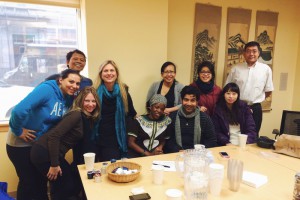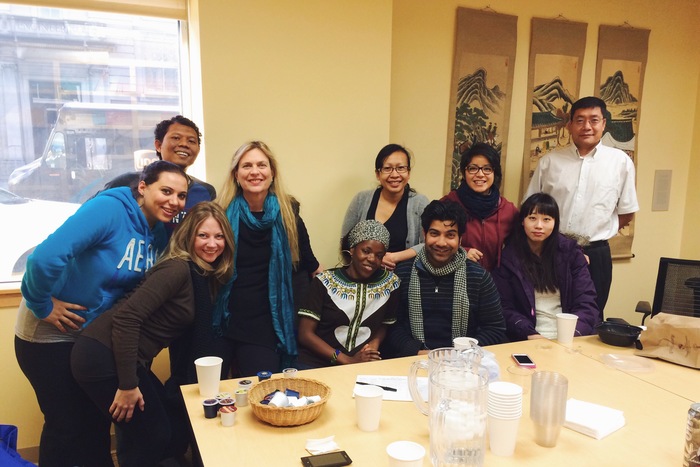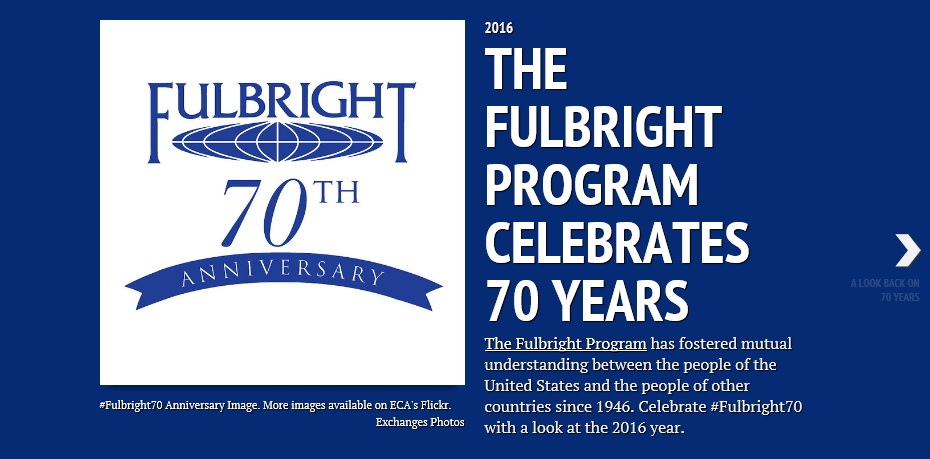
University of Iowa Fulbright Program Adviser Karen Wachsmuth (fourth from left) at a University of Iowa Fulbright Student Organization Brown Bag lunch on Nov. 14, 2014
I have never been one to shy away from a challenge, but helping students devise the “right strategy” for applying for a Fulbright U.S. Student Program award has been a daunting task. As the Fulbright Program Adviser (FPA) at the University of Iowa, a Big Ten institution with more than 30,000 students, it’s my job to assist students in their quest for this unparalleled, life-transforming opportunity. As someone who chose the risky and highly competitive path of pursuing classical music as a career, I thrived on the concept of “following my passion.” Encouraging students to do the same comes easily to me. Although I immediately felt an affinity with the challenge of excellence that Fulbright represented, the “correct path” to a Fulbright award seems more elusive. The steps to a career in music–yes, “practice, practice, practice”–were well-defined and easy to grasp. But how does an applicant best prepare for a Fulbright? What are the most important criteria? By the end of my first Fulbright competition season, I felt slightly dazed. My mind was numbed by too many questions, just like the unfortunate character Meno being questioned by the “stingray-like” Socrates in Plato’s dialogue. I had completed the submission process, but was unsure as to whether or not I had been truly effective as an adviser.
The questions I had about my role as an FPA, which requires me to wear different hats, were many. To start with, Fulbright awards—teaching, research, study, creative work—come in all shapes and sizes, varying by country, language requirements, candidate profile, etc. How do I create awareness of these diverse and exciting Fulbright opportunities on my campus? How should I recruit the most appropriate applicants? What are the key steps in advising? What tools do I need to be more effective? What are the most important criteria for a successful application? And, without years of experience with the position coupled with some success, how can I know which strategies work? Lastly, how can I best encourage and support these ambitious students during the process?
Luckily for me, I found answers to many of these questions by participating in the FPA Development Initiative last year in New York City. I was fortunate enough to join a small group of colleagues from diverse institutions for this intensive training. The wide range of activities gave us an overview of not only the Fulbright U.S. Student Program, but other U.S. Government sponsored grants including the Boren Awards, Gilman and Critical Language Scholarships, and other programs that complement Fulbright. We observed several National Screening Committee meetings, witnessing the selection process in action, and listened to Fulbright Alumni Ambassadors, who embodied dynamism and confidence touched with a wry sense of humor. Several experienced FPA guest speakers told us about the Fulbright strategies that worked for their institutions, and members of our cohort shared their recent successes.
For me, the most valuable aspect of this amazing program was the opportunity to have direct access to the entire Fulbright U.S. Student Program staff at the Institute of International Education, including the Director, Program Officers, Outreach Officers, and country/area Program Managers. Over the course of many sessions, they were unfailingly generous in explaining the simplest to the most complex issues, tireless in their efforts to help us take the process apart and make it understandable. The names listed on the Fulbright website, 1,000 miles away from my job, became my colleagues, people who knew my name, just a phone call or email away. They also provide advisers like me with a wealth of constantly expanding resources on both the Fulbright U.S. Student and Scholar Program websites: detailed grant descriptions; event calendars; webinars, videos, and blogs; alumni directories; and the FPA listserv.
Here are the three most important concepts I took away with me, accompanied by the strategies I’m currently putting into place:
- Fulbrighters, like Fulbright grants, come in all shapes and sizes. There is no one “recipe for success” to become a Fulbrighter; a 4.0 GPA is not a requirement. There are many selection criteria that can come into play: diversity considerations, a demonstrated passion for community engagement, and/or the bold originality of the project. The tipping point for one applicant could be a letter of reference that glows in a special way, for another a poignant moment in a personal statement. It’s my job to encourage those students who are passionate about applying for a Fulbright to see themselves as potential Fulbrighters, unique and capable of stepping up to the challenge. Therefore, I need to recruit a wide range of students.
My Action Plan for Recruitment:
Enlist faculty and advisers. I reached out to faculty and academic advisers across our campus via a short email to recommend their most talented and motivated students for a Fulbright. I was delighted and surprised to receive more than one hundred names of excellent students to contact, many of whom are eager to find out more about Fulbright.
- There’s no “one-size-fits-all” strategy when it comes to promoting Fulbright at different institutions. It’s important to find what works at your institution.
My Action Plan for Promoting Fulbright: “Build on your successes.” I’m highlighting our current successful grantees through:
- Our website and Facebook: Our website now includes recent photos of our current Fulbright grantees, links to their blogs, and articles. We’ve created a link to our new Fulbright group on Facebook to stay in touch.
- Live grantee reporting during information sessions: Since last spring, I’ve asked current Fulbright awardees to present in person or through Skype for each of our workshops. For the Fulbright Intensive Workshop at the end of January, we’ll feature several awardees who are very eager to talk about their experiences teaching in Madrid and Turkey, working at a hospital in Bosnia and Herzegovina, and performing music in Hungary. They are in the best position to answer key questions about their experiences from their peers who are hungry to know more.
- “It takes a ‘Fulbright’ village.” A single fellowships adviser can’t do it all.
My Action Plan for Increasing Our Fulbright Culture on Campus:
- Recruiting more faculty to be involved with the process of mentoring applicants one-on-one.
- Organizing the first “Fulbright Day” on our campus featuring an IIE Program Outreach Officer and hopefully a Fulbright Alumni Ambassador, with keynote speeches featuring two prominent past Fulbright faculty awardees on our campus, including a former Iowa Poet Laureate and a MacArthur Fellow. I’m inviting our Fulbright Association Iowa Chapter and other neighboring chapters to participate. Next year I plan to apply for supplementary funding through the Outreach Lecturer Program as well.
- And finally, staying in touch with the virtual “Fulbright Village.” I can reach out to individuals for advice along the way: veteran advisors willing to share their experiences, the expert IIE staff, and now, our new cohort of FPAs. Our students, the new grantees, are starting to tell their newly-minted stories, and the circle will continue. Fulbright is “a network for life,” and we’re joining it!



4 Comments
Excellent post. The students and university are indeed so very fortunate to have you there to help the students find and articulate their passion!
Karen, your strategies have clearly met with success. Keep up the good work, and keep engaging the faculty!
Keep up the great work, Karen (and team). You all have momentum on your side–momentum is sacred–fight to keep it!
Karen, what a great community you are building! Lucky students and faculty at your institution! Thank you for sharing.